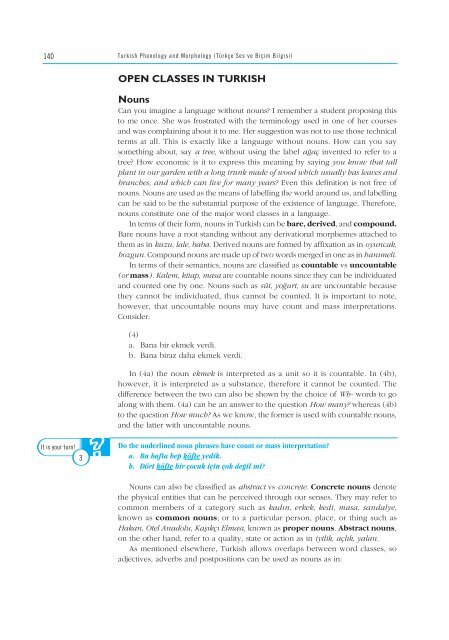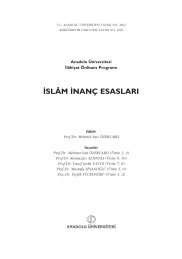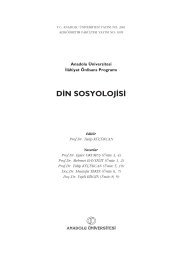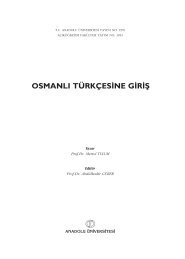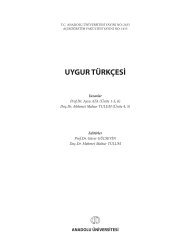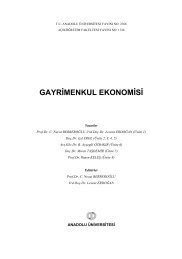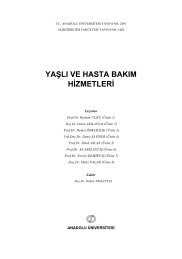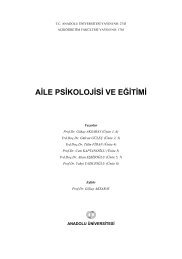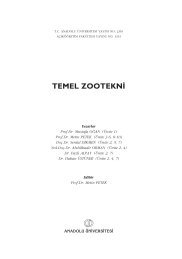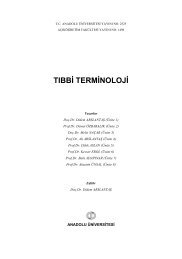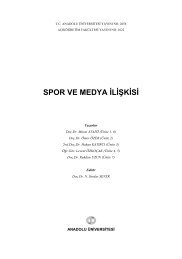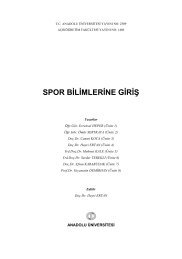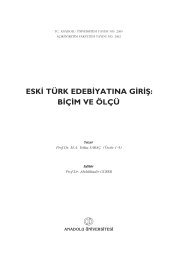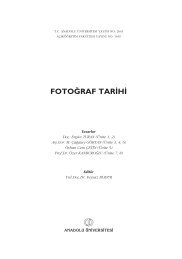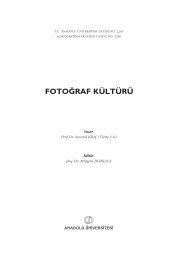turkish phonology and morphology (türkçe ses ve b‹ç‹mb‹lg‹s‹)
turkish phonology and morphology (türkçe ses ve b‹ç‹mb‹lg‹s‹)
turkish phonology and morphology (türkçe ses ve b‹ç‹mb‹lg‹s‹)
You also want an ePaper? Increase the reach of your titles
YUMPU automatically turns print PDFs into web optimized ePapers that Google loves.
140<br />
Turkish Phonology <strong>and</strong> Morphology (Türkçe Ses <strong>ve</strong> Biçim Bilgisi)<br />
OPEN CLASSES IN TURKISH<br />
Nouns<br />
Can you imagine a language without nouns? I remember a student proposing this<br />
to me once. She was frustrated with the terminology used in one of her cour<strong>ses</strong><br />
<strong>and</strong> was complaining about it to me. Her suggestion was not to use those technical<br />
terms at all. This is exactly like a language without nouns. How can you say<br />
something about, say a tree, without using the label a¤aç in<strong>ve</strong>nted to refer to a<br />
tree? How economic is it to express this meaning by saying you know that tall<br />
plant in our garden with a long trunk made of wood which usually has lea<strong>ve</strong>s <strong>and</strong><br />
branches, <strong>and</strong> which can li<strong>ve</strong> for many years? E<strong>ve</strong>n this definition is not free of<br />
nouns. Nouns are used as the means of labelling the world around us, <strong>and</strong> labelling<br />
can be said to be the substantial purpose of the existence of language. Therefore,<br />
nouns constitute one of the major word clas<strong>ses</strong> in a language.<br />
In terms of their form, nouns in Turkish can be bare, deri<strong>ve</strong>d, <strong>and</strong> compound.<br />
Bare nouns ha<strong>ve</strong> a root st<strong>and</strong>ing without any derivational morphemes attached to<br />
them as in kuzu, lale, baba. Deri<strong>ve</strong>d nouns are formed by affixation as in oyuncak,<br />
bozgun. Compound nouns are made up of two words merged in one as in han›meli.<br />
In terms of their semantics, nouns are classified as countable vs uncountable<br />
(or mass). Kalem, kitap, masa are countable nouns since they can be individuated<br />
<strong>and</strong> counted one by one. Nouns such as süt, yo¤urt, su are uncountable because<br />
they cannot be individuated, thus cannot be counted. It is important to note,<br />
howe<strong>ve</strong>r, that uncountable nouns may ha<strong>ve</strong> count <strong>and</strong> mass interpretations.<br />
Consider:<br />
(4)<br />
a. Bana bir ekmek <strong>ve</strong>rdi.<br />
b. Bana biraz daha ekmek <strong>ve</strong>rdi.<br />
In (4a) the noun ekmek is interpreted as a unit so it is countable. In (4b),<br />
It is your turn!<br />
1<br />
It is your turn!<br />
howe<strong>ve</strong>r, it is interpreted as a substance, therefore it cannot be counted. The<br />
difference<br />
1<br />
between the two can also be shown by the choice of Wh- words to go<br />
along with them. (4a) can be an answer to the question How many? whereas (4b)<br />
It is your turn!<br />
to the question It is your How turn! much? As we know, the former is used with countable nouns,<br />
2 <strong>and</strong> the latter 2 with uncountable nouns.<br />
It is your turn!<br />
Do the underlined It is your turn! noun phra<strong>ses</strong> ha<strong>ve</strong> count or mass interpretation?<br />
3 a. Bu 3hafta<br />
hep köfte yedik.<br />
b. Dört köfte bir çocuk için çok de¤il mi?<br />
It is your turn!<br />
4<br />
It is your turn!<br />
Nouns can also be classified as abstract vs concrete. Concrete nouns denote<br />
4<br />
the physical entities that can be percei<strong>ve</strong>d through our sen<strong>ses</strong>. They may refer to<br />
common members of a category such as kad›n, erkek, kedi, masa, s<strong>and</strong>alye,<br />
It is your turn!<br />
5<br />
It is your turn!<br />
known as common nouns; or to a particular person, place, or thing such as<br />
Hakan, Otel 5 Anadolu, Kafl›kç› Elmas›, known as proper nouns. Abstract nouns,<br />
on the other h<strong>and</strong>, refer to a quality, state or action as in iyilik, açl›k, yalan.<br />
It is your turn!<br />
As mentioned It is your turn! elsewhere, Turkish allows o<strong>ve</strong>rlaps between word clas<strong>ses</strong>, so<br />
6 adjecti<strong>ve</strong>s, 6 ad<strong>ve</strong>rbs <strong>and</strong> postpositions can be used as nouns as in:<br />
It is your turn!<br />
It is your turn!<br />
7 7<br />
It is your turn!<br />
It is your turn!<br />
8 8


